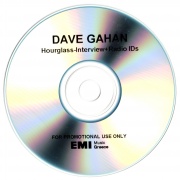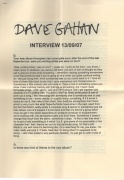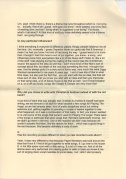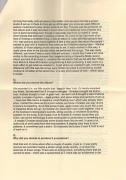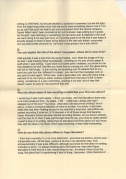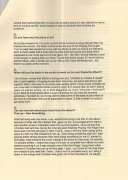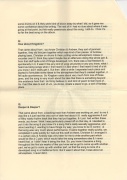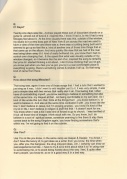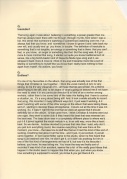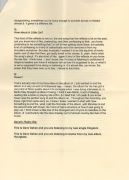2007-09-13 EMI, London, UK
| This recording-related article is a stub. You can help DM Live by expanding it. |
Notes
After having been to Berlin to talk to the German press, Dave Gahan spent three days at the Berkeley hotel in London. On the final day, (the 13th), Dave Gahan not only went to Capital FM studios for an interview but also recorded a promo interview conducted by EMI. This interview not only regards the creation process but also examines each song of the album. It was meant to be sent out to several media across the world to use, and also contained two generic radio IDs. Copies of EMI Greece's release seem to have emerged on eBay in the following years.
The following is a FLAC rip from one of these EMI Greece CDs. The 24 audio files have then been converted into one single MP3 file and uploaded onto Box.com. The CD also came with a nine-page transcript of the audio. These pages have been converted into text using OCR and is shown below. Please note that the questions do not appear on the CD.
- Duration: 31:04 minutes
Audio
Transcript
Q 1: Your new album Hourglass has come quite soon after the end of the last Depeche tour, were you writing whilst you were on tour?
Was I writing while I was on tour? I guess so, I write all the time — you know, I mean lyrics or whatever you wanna call them, just sort of train of thought as they call it, and you know write something. I remember reading something somewhere once that someone said if you're going to be a writer you gotta continue writing. So like just doing that I think sometimes later on you come back to it. I have all kind of these little black books that I carry everywhere and Dictaphones so... Sometimes a little melody idea will come or I have a line or something where you know I hear a strong melody with that line or something, but I never really formulate songs, until I get to, well what I'm finding is until I get together with whoever it is I'm writing with. You know I don't sit down at the piano and sort of work out a song, I like interacting with somebody else and somebody else to play something to me — some chords, or a guitar line or something, and if it works it works for me and then take it from there, then build the atmosphere from there, which is very much like what Depeche Mode have done in the past, apart from the fact that Martin really writes a complete song and demos it, sometimes less full than others, but he'll present it to the band and then it's kind of a group effort once we get in the studio depending on whatever producer or programmers we're working with, the atmosphere gets built from there. Sometimes it doesn't change that much from the demo, sometimes it does. I'd like to feel that what I do is sort of add something to it which I try and give some of my personality or the character that I feel I wanna act out on that particular song. So that's with Martin's, but with mine it's becoming like, it's a new thing for me, you know. I'm really really enjoying it. It feels, feels like I'm doing what I'm supposed to be doing. I don't feel pulled in any particular direction, it's just get on with it kind of thing.
Q 2: Is there any kind of theme to the new album?
Um, yeah I think there is, there's a theme that runs throughout which is me trying to... actually, first of all I guess time past you know — time wasted, you know fear of wasting time, and am I doing what I'm supposed to be doing? You know, what's it all about? All that kind of stuff you know definitely seems to be a theme that I am going through.
Q 3: Any particular influences?
I think everything and everyone and difference places, things, people influence me all the time. Um, musically I guess Depeche Mode you gotta say first and foremost. I mean I've had you know I've kind of had along the way I guess learnt a lot more than I thought I had from how to sort of put together you know - a song, and influences come from everywhere like a lot of like blues stuff I listen to, like a lot of the stuff I was playing during the making of this record was the Grinderman record, the space and the idea as well like, I don't know kind of like Nick's sort of concept about this, but death of the rock star something like that, I thought that was. And he always puts it in a very sort of funny way, very much like what Ziggy Stardust represented to me years and years ago, I sort of see bits of that in what Nick does, but also just the fact that, you can start with like an idea, like that old blues sort of idea, that you know you start with an idea and then you improvise on that same idea, a lot of dance music is like that as well, sort of improvisation on a, on a riff you know, songs like Deeper and Deeper are very much that.
Q 4: Why did you choose to write with Christian and Andrew instead of with the old band?
It just kind of went that way actually see Christian and Andrew and myself had been writing, we we demoed a lot stuff for what became a few songs for Playing The Angel, so we had already been kind of pretty disciplined about our writing sessions and getting together and spending a couple of weeks together to see what happened, so it was a continuation of that really. In fact, you know I wanted to re-visit some of the songs that weren't used for Playing The Angel. There were a few songs in particular that were songs that I felt were particularly moving, but we didn't go there in the end. One of the reasons we didn't was because we couldn't actually find them, find the demos for them, which was a good thing in the end because this became definitely a body of work.
Q 5: Was the recording process different to when you last recorded a solo album?
Yeah, it was very different to that because Paper Monsters was built around the idea that Knox and I first of all got together to write songs, and I go over to his house and in his little spare room with a little set-up, and a lot of it was um, first of all the demos were very performed him playing guitar or cello or bass you know and me sort of singing down vocal melodies and lyrical ideas, but I didn't start properly forming that really until we were in the studio. And we went into like a proper studio and set up in there and Knox set up all his gear you know we used different session musicians to play certain parts and um Ken Thomas was the producer on that album and it was recorded in much more of a traditional kind of sense of a sort of band recording even though I was really just Knox and myself and some other friends that took part in playing on there. So I kind of like had more of an idea of it being a complete thing. It was an album and I was definitely going to tour it and I was going to put a band together and had a very good idea about the people I wanted to play with and hopefully they were up for it Martine playing bass — Martine LeNoble, and Victor playing drums was key to me. It really worked in that way, it really came alive to me actually when we performed the songs. This was really different, you know it was a really different process. I would say it was a lot more similar to the recording process that happens during a Depeche Mode record, where you kind of all muck in, certainly the last album that we did with Ben Hillier, Rick Morris and Dave McCracken programming and Ben producing, it was more of a team effort to get what we needed to, to get where we needed to get. And the big difference with this was the songs were written recorded and produced by myself, Andrew and Christian at the same time, in a very short space of time — within about 8 weeks.
Q 6: Where did you record the album?
We recorded it in my little studio that I have in New York, it's barely equipped you know, but we went out and bought some gear. Christian brought his drums over, Andrew brought a load of gear over, we went out and bought a load of stomp pedals, a couple of guitars — bass guitars, and some amps and just kind of set up. I have two little rooms and there's a small floating room which was already there when I rented the place so it's a room where you know Christian can play drums and there's no bleeding. So in that sense it was, again it was very much like a sort of Depeche Mode set up, and Christian and I would sit in one room together, kind of at the keyboard playing piano sounds, string sounds, or whatever and working together on the song, and we'd pass it on to Andrew and Andrew would then you know, use all the technology and play some guitar or some bass or something on it, and maybe Christian would play some drums down first as well. It came a lot, quite a lot of stuff came from that improvisation and playing bass lines and drum patterns, and sometimes just a piano. But basically we'd pass it back and forth and sort of work on it.
Q 7: Why did you decide to produce it yourselves?
Well that sort of came about after a couple of weeks, it just er, it was pretty obvious we recorded maybe a dozen songs pretty quickly, or at least the sketches of those songs. There was an energy there, something there that we wanted to keep — there was a sparseness to it, there was an excitement in the writing and it felt fresh, so we just decided to produce it ourselves, but we felt right from the beginning pretty much that we would need somebody else to mix it. Um, so up until that point we hadn't got any involvement from the record company, Daniel Miller hadn't been involved at all, but he knew I was writing and er I guess he thought I was demoing or something, but he came over and listened to the stuff we were doing and he said just carry on it sounds great and he felt that it was leaps and bounds ahead of what I'd been doing before in the last solo album song wise, and sounded pretty personal so we knew it was going to be a solo album.
Q 8: Can you explain the title of the album 'Hourglass', where did it come from?
Well actually it was a line from the song Endless, but I liked the image of it too as well. I was drawing these hourglasses doodling on my sort of lyric paper and stuff when I was writing, it just stuck and at some point I realised, you know for me that metaphor as well, that like you know time is running out, and the glass being half full or half empty, and then during the recording sort of realised that at any point you can turn the, different to a glass, you can turn the hourglass over at any point and start again. Which was quite a good idea, but also just every song seemed to be me trying to either redeem myself from that way I'd felt I'd been acting sometimes in a very controlling, 'wanting it my way' sort of way that doesn't seem to work for me anymore that well.
Q 9: Was this album easier and less daunting to make that your first solo album?
I would say it was much easier. I think, you know with the first album there was a lot more pressure from my peers, I felt, — what was I doing, why had I stepped out of the box? You know, what was it all about kind of thing? And it was a, it was a conscious decision of mine to do that. You know, I had these ideas that had been floating around in my head for a long time, way before we started recording Exciter so, and I'd demoed a lot of those songs that became Paper Monsters before we even started recording Exciter, so you know I already had the idea to do that, it was just the right time for me, you know to really stretch myself and dive-in to writing, rather than to talk about it and think about it and you know, play with the idea in my head, which was becoming, it was really exhausting.
Q 10: How do you think this album differs to Paper Monsters?
I think that musically it's a lot more electronic, you know we tend to, tend to use, manipulate even, all the bass, guitars and drums in an electronic way. And atmospherically it was quite different, although you know for me when I'm writing melodies and lyrics, I'm always thinking about the same as I was with Paper Monsters it's like kind of a very visual thing for me, it's where I kind of put the song, the place that I'm performing it kind of thing, becomes, I think that kind of comes from performing with my band for so many years its very natural for me to kind of conjure up this small theatre or club or whatever that involves an audience.
Q 11: Do you have any live plans at all?
Not at the moment no, I'm quite content at the moment to enjoy the fact that I've finished the record. It's taken a while since the end of the Playing The Angel Tour to really feel present at home with my family and with my kids and my friends and stuff, and that's really first and foremost the most important place and thing that's happened to me in the last sort of five years. So I feel like I've just finished a tour to be honest. In saying that, you know, I know that these songs, and I would love to perform them, with a similar set up as I did on the Paper Monsters tour, but there's no plans at the moment.
Q 12: When will you be back in the studio to work on the next Depeche Album?
I don't know. I know that Martin's writing now and Christian and Andrew and myself plan to get together. I'm going to see them tomorrow, but we're planning to get together later in the year to do some more writing which I think would probably be you know with a Depeche Mode record in mind, and in saying that, as well I wanna really not edit the writing I do or think about that too much, otherwise I find that if I try to think to much about what it is you're writing for you lose the moment somehow. You start to, you know, some ideas come in the back of your head of like how it is perhaps that you're supposed to sound, and that is what I'm trying to get away from.
Q 13: Can we now talk about each track from the album? First up — Saw Something.
Well that song was you know, I put, wanted that song to be first on the album because it really was the catalyst that gave me the encouragement to wanna start another project. It actually came from a chord pattern, some strings that Christian had sent me, during the time we were finishing 'Playing The Angel'. And there was one time we were in New York and I was in the live room sitting at the piano and I had my little Dictaphone set up, I was doing something else but I kept playing these strings because they were doing something for me and I started to formulate what became the vocal melody and the lyrics for that song. So actually, I'd actually written, I heard that song in its sort of complete form before we even started recording it, so it was actually one of the first things I sang down when Andrew and Christian had set up all their gear. I said — you know let me sing down this melody and lyric idea that I have, I had a sort of complete song, so I sang it down to the strings that Christian had given me in the first place and he played some drums on it and they were kind of blown away by what I did, so it gave me some confidence about the writing. The rest of it I had no clue about where it was going at that point, but felt really passionate about this song, I still do. I think it's by far the best song on the album.
Q 14: How about Kingdom?
That came about from, you know Christian and Andrew, they sort of jammed together, they did this jam together which was kind of ten pieces of Andrew playing bass, Christian on drums and them putting some atmospheric noises or vocoders over it. I think they spent maybe like an afternoon doing this whole jam and from that stuff quite a lot of things developed. Um, there was a real freedom and spontaneity in it, it wasn't like any kind of song structures or any you know, what I heard as being songs when I first heard it in fact when I first heard it kind of a bit you know I don't really get it. But then after a while I separated each piece and started to formulate some ideas to the atmosphere that they'd created together, it felt quite spontaneous. So Kingdom came about very much from one of those jams, and the song is very much about the idea that there is something beyond this existence here that I do firmly believe in, and kind of yearn to feel more of. So I had this idea to sort of um, you know, create a place to go, a sort of fantasy place.
Q 15: Deeper and Deeper?
That came about from a backing track that Andrew was working on, and to me it was like a it just had this very sort of dark feel about it and really aggressive and sort of filthy nasty rhythm track that they had put together, and I just had written these words, you know I think I was particularly pissed off on that day, and I decided to put it into the song and you know it's a song that's really sexually aggressive, and about wanting it, wanting to have things my way, you know to be in control, and that song was very much about performance. It came together really quickly, we completed it quite quickly and I had put this stuff on there, Christian and I arranged it in a certain way and Andrew was very keen for me to write another part which would be like a C part, which would take the song somewhere else and I never heard that, or I didn't hear it being like that. So, you know it became a thing throughout the first six weeks of like you know we've got to come up with another part, we've got to come up with another part, so that the song is more of a developed song in a traditional form. But it wasn't about that, it was about an atmosphere, I never did it.
Q 16: 21 Days?
Twenty-one days was like, Andrew played these sort of discordant chords on a guitar and almost out of tune and it inspired this, I know it had a, to me it had a very Stooges feel about it. At the time visually there was this, outside of the window, my studio is in a very busy part of New York and um across the road we used to have a view of the river and there was a, there was a building being built and it seemed to go up so fast like a, it's kind of another one of those time things that er, that came up on the album. And very quickly the view that we had of the river was being taken away and it kind of really bothered me, you know that I had no control over changing that, and the speed that what was visually outside of my window changed, so it became like the sort of er, inspired the song and certainly the lyrics and I started thinking a lot about, I don't know thinking that you've got, you know just when you feel you've got, you're in a real comfortable place and everything is going, there's something comes and shakes it all up. So that song kind of came from there.
Q 17: How about the song Miracles?
That song was, again it was one of those songs that I had a lyric that I wanted to just sing as it was, I didn't want to add another part to it, it was very simple, it was just a simple idea with two verses that really said it all. This feeling that I often have of contradicting myself, you know wanting to believe in something but also at the same time my disgust at that, not being comfortable in my own skin. So I kind of like wrote this lyric that hints at the things that I, you know believe in, or want to believe in. And also at the same time contradict it with, you know like the line 'I don't believe in Jesus, but I'm praying anyway', you know it's kind of like my lot in life, I don't believe in religion and stuff like that — it doesn't work for me. You know when I was a kid I was kind of forced to go to church, I was terrified of it but all those kind of images I think stuck with me. So you know, but I do believe in a sort of spiritual sense, somehow yearning to live there and stay there comes back to the song Kingdom again, you know finding somewhere that's within me, I'm not going to find it on the outside.
Q 18: Use You?
Use You is like you know, in the same camp as Deeper and Deeper. You know, I don't have the luxury of, to get ideas as a writer from you know, the time when you, after you, the hangover, the drug induced ideas. Um, I certainly can draw on past experience but like, I have to try and sit and think about what it is I'm using now to avoid being me, or to avoid being honest about the way I feel, and quite often that's people, you know er, so er in a good way and in a bad way.
Q 19: Insoluble?
That song again it was about believing it something, a power greater than me that has always been there with me through, through my life, from when I was a kid, this sense that someone's watching or something's watching over me. I've always had that you know, and sometimes I chose to ignore it and take back my own will, and usually end up you know, in trouble. The definition of Insoluble is something that's not tangible, an energy or something that is there that you can't feel, or you know, an angel or something like that. But the song was, and it got more and more minimal that song, it started out quite you know traditional sort of sense, like a big bombastic kind of Depeche Mode type song and it, we stripped it back more and more and I think in the end it became more like a sort of Mantra or something to myself like you know that I really have nothing to fear apart from myself, my actions, you know.
Q 20: Endless?
It's one of my favourites on the album, that song was actually one of the first things that Christian and I put together. I think the vocal melody and lyric is very strong, to me it's very visual all of it — all these themes are similar. It's a theme about trying to be still, and to be aware of what's going on around me and not have the need to steer it in any particular direction and to kind of be a worker among workers, rather than to be some kind of like have this feeling that I have to control a situation, so, it's a song about being still. And it took a while actually to record that song. We recorded it many different ways and it, it just wasn't working, and it wasn't working with some of the other songs on the album that were taking these sort of, starting to develop these atmospheres, it stuck out all the time it was not working. So, it wasn't right till the end that we were all agreed that it should definitely be on the album, and that came from, I think Christian and Andrew went out one night, they went to some club and they heard this beat that was reversed um the beat was. The bass drum was in a completely different place to where we'd put it and it jarred against the vocal melody in a, in an odd way, more like a heart beat. So we decide, Andrew decided to pursue that idea then I said, why don't you just turn everything round, like reverse everything that was there at the moment, you know — the bass line and stuff like that so it had this kind of like sort of sucking, breathing feel about it all the time, and it just, it just worked, it just all came together. In fact Daniel Miller came to the studio, when he first heard that song it just washed over him, he didn't get it, or it didn't do anything for him in one of the first kind of arrangements we had of it, but now it's his favourite I believe, you know, he was telling me. You know the way we finally sort of recorded it was kind of an accident, seems like a lot of the really good ideas that happen in the studio seem to happen like that when you, just when you know how something's supposed to sound, you know and you get there and it's disappointing, sometimes you're lucky enough to stumble across a mistake almost and it gives it a different life.
Q 21: How about A Little Lie?
That kind of like reflects to me on, the one song that like reflects a lot on the past, just you know kind of like, pretending, and then confessing to that, you know, pretending to be something that I'm not and then getting stuck there, but actually kind of confessing to it kind of cathartically sort of er removed it from my shoulders somehow. But also musically I wanted it to be this big kind of bombastic sort of idea that then, got really small in the verses, and yeah, that's what the song's about. It's also kind of like again it kind of like reflects on you know, the lies that I think have, I don't know, like I'm tired of listening to politicians and religious leaders you know and whatever tell us how it's supposed to be, or what it is we're supposed to be doing or believing in. It's almost like you know, the power that they have over us is fear. I refuse to live there.
Q 22: Down?
That's actually one of my favourites on the album and I just wanted to end the album in a very un-sort of-Hollywood way. I mean, the album for me has got a very kind of filmic quality about it and someone when I was doing interviews in, in Berlin they brought up about it being, I think it was Berlin, it sort of playing, reading like a book or playing like a film, and I liked that. Um yeah and you know Down was the perfect song to end the album on. Throughout the recording, you know, right from quite early on, I knew I knew I wanted to start with Saw Something and end the, what I call the first side of the album, with Miracles and end the second side with Down. So I kind of had a structure of how it was going to play out. I think Down is like one of the strongest sort of lyrics and melodies on the album, and I particularly like the slow drawly sort of almost country-like feel of the music.
Generic Radio IDs:
This is Dave Gahan and you are listening to my new single Kingdom.
This is Dave Gahan and you are listening to tracks from my new album Hourglass.

